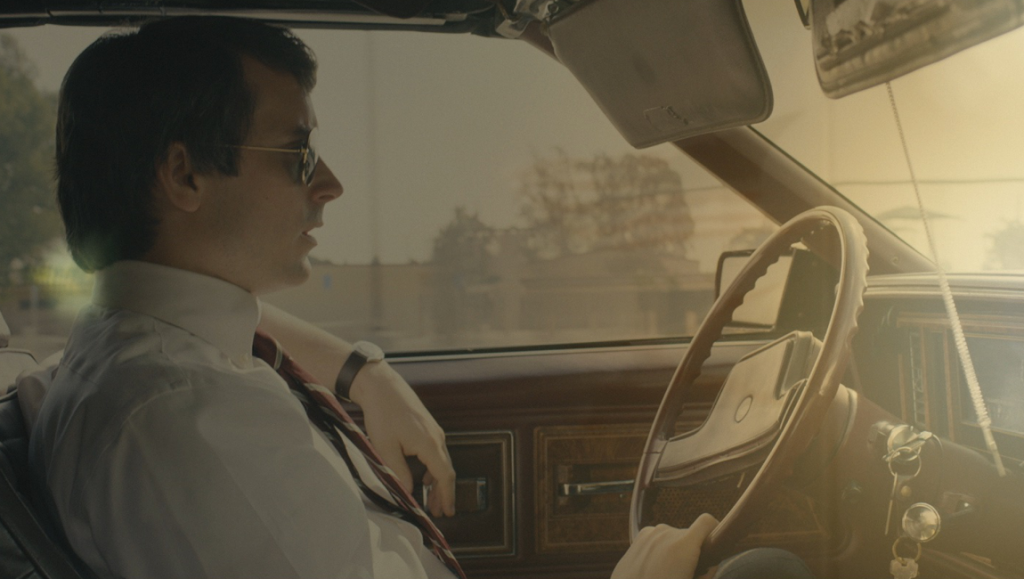No Man of God works surprisingly well for a while, but fails to stick its schlocky landing.
On the day before the official premiere of the latest Ted Bundy thriller No Man of God, director Amber Sealey received a scathing letter from true-crime enthusiast & fellow film director Joe Berlinger. The letter — which contained a glut of baseless slander accusations from the man who recently mounted his own Bundy film starring Zac Efron as the handsome psycho — primarily focused on Sealey’s previous interview comments on how Berlinger’s crime-related thrillers often glorified notorious killers. As humorous and toxic as this spontaneous filmmaker beef is on the surface, the whole situation genuinely begs a couple questions. What compels us to adapt the lives of murderers for the big screen — entertainment, artistic self-gratification, basic schadenfreude? And who holds the right to tell these stories to begin with? Victims? Witness? Any old interested bystander? The answers are certainly complicated, and in their absence, the go-to rule of thumb when it comes to such creations is to simply avoid platforming the perpetrators. Ethically speaking, it seems safest not to glorify or mythologize a person known for mass or serial murder.
That established, No Man of God tells Bundy’s story through the perspective of renowned FBI Analyst Bill Hagmaier, an operative widely considered to be one of the most prolific criminal profilers in the world. Sealey’s film recounts various interviews dating from 1985 up until Bundy’s death in 1989, and she predominantly focuses on direct dialogue between FBI analyst Hagmaier (Elijah Wood) and Bundy (Luke Kirby). This dynamic narrative setup, which accounts for the film’s first two acts, is admittedly eerie and suspenseful, and frequently enthralling. The two performers constituting the core of the film’s central conversations do aces work, and the interrogation sequences consistently deliver a unique perspective on the Bundy case, without relying on needless theatrics. In fact, with the exception of a few technical gripes, including some frequent overcutting that occasionally disrupts some of the more tense moments, the flow and smart blocking of these interrogation scenes deliver a largely non-exploitative experience.
For her part, Sealey’s direction shines in scenes involving silence and stillness. The film’s most notable such sequence is set during a televised interview with Bundy, where we see a young female crew member blankly staring in disgust at the evolving broadcast conversation between Bundy and the invested reporter. The scene offers an intelligent, subtle critique of the dangers of sensationalization, and indicts the exploitative enterprise of giving syndicated space to such people in the interest of economic or political gain. Where one person might find stimulation or seek introspection in a televised program of this magnitude, others will simply watch in horror as their mind suffers through another traumatic unraveling; fear of the murderer never stops, even post-mortem.
It’s ironic, then, that a conflict of interest arises in No Man of God’s final act regarding Sealey’s intent. For a film that so narrowly avoids any romanticizing of Bundy’s legacy, the sudden shift in character during the final major confession scene is jarring. Completely contradicting the pre-established and carefully-layered drama of the film’s preceding sequences and character arcs, the scene in question relies on gruesome descriptions of Bundy’s murder process, all in the name of a disturbing climactic kick. But the scene doesn’t add anything particularly new or certainly nothing nuanced to the conversation of Bundy’s fear-mongering, and instead only diminishes the alluring impact and dexterity of the film’s core interrogation scenes. It’s an ending that reflects a profound diminishment of No Man of God’s prior accomplishments as a psychological thriller (and one that situates Sealey’s work closer to Berlinger’s cinematic crimes).
There’s no denying that No Man of God is a strange beast of a film, one that almost succeeds as keen, formidable crime drama until it falters at the feet of grand hypocrisy. That’s not to deny the accomplishments that are present: all key players on the technical and performance front deserve credit for their commitment to and excellence in/on a project that originally started as an unconventional retelling of the Bundy case. It’s profoundly unfortunate, then, that No Man of God is that rare film so utterly undone by its final sour note: a scene of schlocky shock-value that should have been lost on the cutting room floor.
Originally published as part of Tribeca Film Festival 2021 — Dispatch 2.


Comments are closed.